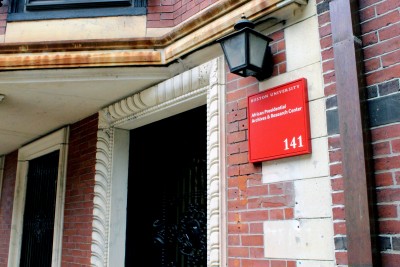
Boston University’s African Presidential Archives and Research Center is set to close in June, a decision which not all members of the community support. PHOTO BY MAE DAVIS/DFP FILE PHOTO
Charles Stith, the director of Boston University’s African Presidential Center and the former U.S. ambassador to Tanzania, held a press conference Friday to explore the reasons behind the center’s closure and elaborate on its mission.
The center will close its doors on June 30, The Daily Free Press reported on April 22. At the time of the announcement, BU spokesman Colin Riley said the reason behind the closing was a financial one. The APC, which operates off grants and funding from external entities, was not able to raise enough money over the past year to stay open, Riley said.
Stith said BU President Robert Brown’s administration was actually aware of the center’s closing earlier than this academic year. At the press conference, Stith read an email he received April 16 from someone he identified as a high-ranking BU official.
“‘You brought something of great value to BU, asking for very little in return. On the other hand, this is no great surprise,’” Stith read. “‘As you no doubt remember … I was personally offered “30 pieces of silver” to shut down your operation. I was utterly appalled … I am happy and a bit surprised that you were able to survive at BU for seven more years after the initial planned assassination of your program.’”
He also brought up BU’s claim that they reached out to the State Department to look for funding for the center. Stith, however, said he had never heard of the university doing that for the APC. Brown, Stith said, is closing the center because he believes that it is not worth maintaining.
“The issues raised relative to APC are just the tip of the iceberg. President Brown and the Board of Trustees have a decision to make,” he said. “Do they want to continue the charade that nothing is amiss and have the [plethora] of facts come to light, offense by offense, and drag the university through the mud, as well as [drag] the city and state? Or will they do the right thing and self-correct?”
Stith said the closing of the center is part of a greater trend in the leadership decisions at BU.
“While the focus of the recent coverage has been the closure of the African Presidential Center, I think it is important to understand that President Brown’s action against APC is reflective of [a pattern] of hostility and discrimination against the African-Americans that has typified his tenure as president,” he said.
Stith said there are fewer African-Americans in BU’s faculty today than in 1976, during which two percent were African-American. Additionally, Stith said, the university is not doing enough in offering admissions to African American students.
“This record is all the more egregious for an institution that numbers among its alums Martin Luther King Jr., Barbara Jordan and Edward Brooke and members of the Mandela family,” he said. “Dr. Martin Luther King Jr. would be ashamed of BU’s record and we should too.”
Stith also addressed the controversy surrounding the tweets of Saida Grundy, an incoming BU sociology professor. He pointed out that she has apologized for her remarks as well as the distraction it has caused within the university. At this point, he said, Grundy has little power to affect BU in any way, while Brown does.
“Robert Brown … has an enormous amount of power,” he said. “I find it ironic that this very real threat to African-Americans at this university has not gotten nearly the national attention that a perceived theoretical threat to white interest has received … [African-Americans’] interests continually get treated as secondary in any discussion.”
Several students attended the press conference to show their support for the APC.
Jamiee McGruder, a sophomore in the College of Communication, said a lot of students are unaware of the existence of the APC.
“This university doesn’t really do anything to promote it or let us know it exists or what resources are here,” McGruder said. “I thought it was really important to be here to support it … to hear what their statement was.”
Amina Egal, a sophomore in the Sargent College of Health and Rehabilitation Sciences and a member of the People of Color of Coalition, said she attended the conference to get a better glimpse of the issues that will be discussed in the future.
“I kind of wanted to know more information from the ambassador himself and the future of APC and what the university is doing to talk about this issue and what [the university] is going to be doing in the future,” she said.
Fatima Mohie-Eldin, a senior in the College of Arts and Sciences, said she was grateful to attend Stith’s talk, despite the fact that she is graduating.
“I’m leaving as a senior so a lot of people ask me why I’m still interested. It’s about what kind of school I’m leaving behind. How many other schools can say they have a center like this? I was so upset when I heard it was closing,” she said. “Even though I’m on my way out, I still want to show my support and I hope that it can stay open.”
The post African Presidential Center director looks into reasons behind closing appeared first on The Daily Free Press.
